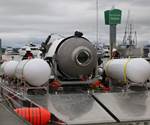OceanGate's Titanic expedition rescheduled
The five-person carbon fiber and titanium submersible Titan will survey the Titanic wreckage in the summer of 2019.
OceanGate Inc. (Everett, WA, US), a provider of manned submersible services, announced May 15 that it has rescheduled its 2018 Titanic Survey Expedition to the summer of 2019.
Titan, OceanGate’s newest 5-person submersible, is designed to dive to depths of 4,000m (2.5 miles) in order to conduct the first manned expedition to Titanic since 2005. The final phase of preparation for the expedition includes testing the carbon fiber and titanium sub to the maximum design depth. The test plan includes a series of dives in an incremental stair step approach to reach 4,000 m in a safe and controlled manner.
Deep sea testing began in late April near Marsh Harbour in the Bahamas. Upon arrival the sub’s electronics sustained lightning damage that affected over 70% of its internal systems. Due to the damage and stormy and windy conditions, the team was unable to complete the first 4000m dive at least 45 days prior to the Titanic Survey Expedition – a key decision point in the testing timeline and a trigger for a go/no-go decision to conduct the expedition in 2018.
“While we are disappointed by the need to reschedule the expedition, we are not willing to short cut the testing process due to a condensed timeline,” says Stockton Rush, OceanGate CEO. “We are 100% committed to safety and want to fully test the sub and validate all operational and emergency procedures before launching any expedition.”
OceanGate plans to continue deep sea testing in the Bahamas as it prepares for the rescheduled expedition in 2019.
Related Content
-
Welding is not bonding
Discussion of the issues in our understanding of thermoplastic composite welded structures and certification of the latest materials and welding technologies for future airframes.
-
Prepreg compression molding supports higher-rate propeller manufacturing
To meet increasing UAV market demands, Mejzlik Propellers has added a higher-rate compression molding line to its custom CFRP propeller capabilities.
-
Aerospace prepregs with braided reinforcement demonstrate improved production rates, cost
A recent time study compares the layup of a wing spar using prepreg with A&P’s TX-45 continuous braided reinforcement versus traditional twill woven prepreg.






